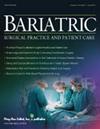Correlation of Preoperative Prognostic Laboratory Markers with Bariatric Surgery-Related Complications
IF 0.3
4区 医学
Q4 NURSING
引用次数: 0
Abstract
Introduction: Bariatric surgery is defined as the best long-term treatment for morbid obesity and this leads massive increase in bariatric surgeries worldwide. However, these procedures are associated with severe morbidities and mortalities. And the clarification of preoperative predictors is still unclear today. Materials and Methods: We collected all clinical and laboratory findings of the patients retrospectively who underwent elective bariatric surgery at our hospital (2018–2021). We evaluated the parameters in terms of predictors of early complications. Results: From January 2018 to August 2021, 325 patients underwent bariatric surgery (sleeve: 172–bypass: 153). In total, 24 patients had early postbariatric complications (11 leak, 10 bleeding, and 3 pulmonary embolism). After evaluation of the data, preoperative laboratory markers and ratios were not found to be significantly associated with major complications. Only “asthma” as a comorbidity was a significant predictor of postbariatric surgery complications. Conclusion: The preoperative laboratory markers and ratios are potential prognostic factors for postoperative morbidities and mortalities in patients undergoing bariatric surgery. Our clinical findings do not correlate with major complications. More prospective studies and larger number of patients are needed to shed light on the potential importance of these parameters. Clinical trial Registration number: 2021/09-17.术前预后实验室指标与减肥手术相关并发症的相关性
简介:减肥手术被定义为治疗病态肥胖的最佳长期治疗方法,这导致全球范围内减肥手术的大量增加。然而,这些手术与严重的发病率和死亡率有关。而术前预测因素的澄清至今仍不清楚。材料与方法:回顾性收集我院(2018-2021年)择期减肥手术患者的所有临床和实验室结果。我们根据早期并发症的预测因素来评估这些参数。结果:从2018年1月到2021年8月,325名患者接受了减肥手术(套管:172 -旁路:153)。总共有24例患者出现早期减肥后并发症(11例泄漏,10例出血,3例肺栓塞)。在对数据进行评估后,术前实验室标记物和比率未发现与主要并发症有显著相关性。只有“哮喘”作为合并症是减肥手术后并发症的重要预测因子。结论:术前实验室指标和比值是影响减肥手术患者术后发病率和死亡率的潜在预后因素。我们的临床发现与主要并发症无关。需要更多的前瞻性研究和更多的患者来阐明这些参数的潜在重要性。临床试验注册号:2021/09-17。
本文章由计算机程序翻译,如有差异,请以英文原文为准。
求助全文
约1分钟内获得全文
求助全文
来源期刊
CiteScore
0.80
自引率
0.00%
发文量
36
期刊介绍:
Bariatric Surgical Practice and Patient Care is the essential peer-reviewed journal delivering clinical best practices and quality updates for achieving optimal bariatric surgical outcomes.
Bariatric Surgical Practice and Patient Care coverage includes:
Quality outcomes measurement and reporting
Process innovations and care delivery
Short- and long-term surgical complications
Pre-surgical diagnosis and consultation
Pre-op, peri-op, and post-op standards of practice
Patient access
Patient safety issues
Nutritional and dietary support
Bariatric surgical emergencies
Best practices and current standards for bariatric surgery
Culture and ethics
Body contouring and reconstructive surgery
Bariatric teamwork and communication.

 求助内容:
求助内容: 应助结果提醒方式:
应助结果提醒方式:


